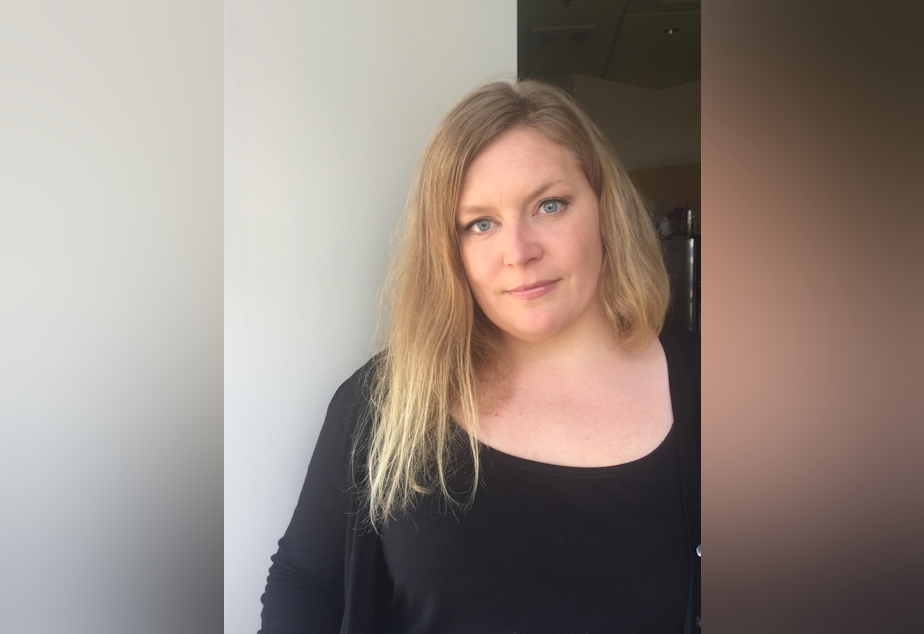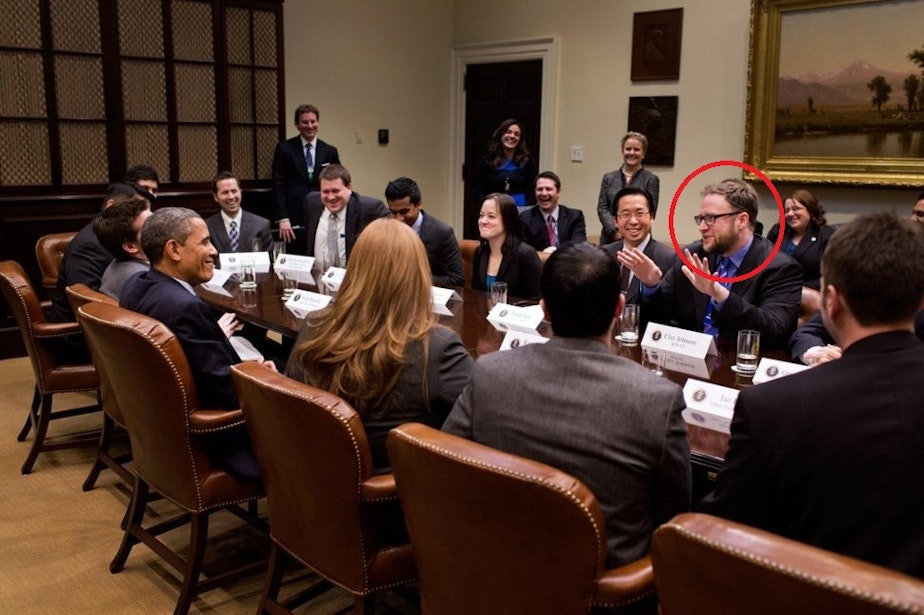She accused a Democratic darling of assault. Then her career dissolved

I
f you live in the Seattle area, you know Sarah Schacht’s work. She’s behind those easy-to-read food-safety ratings in every restaurant: smiley faces that tell you about the food safety there.
Sarah advocated for those ratings by telling about her experiences contracting E. coli twice at Seattle restaurants.
Now she’s highlighting another problem, one that’s shadowed her for a decade. On this episode of Battle Tactics for your Sexist Workplace, Sarah discusses the toll a sexual assault took on her career.
The assault
Sarah has known since college that she wanted to use technology for democracy. During the 2004 presidential race, she took an unpaid job with the Howard Dean campaign in Vermont.
The campaign had houses where staffers could crash. Sarah got an air mattress on the floor in a living room, which is where she was one night when another staffer stumbled into the room, appearing either intoxicated or ill.
“I walked over, and I was like, ‘Are you OK?’ Kind of holding him up,” Sarah said. “And he kissed me, and I was surprised. And I suddenly found myself pinned to his bed and holding him off of me, telling him no and telling him to stop and ‘don't do this.’”
Sarah managed to hold him off until he passed out, and she left the house the next day. She kept working with the campaign, eventually taking a paid job in Iowa.
That’s where she was when a Dean campaign official called asking if something had happened. Sarah reluctantly told the official about the assault and was connected with an attorney who asked a series of uncomfortable questions.
The attorney told Sarah that her attacker was just given a verbal warning.
The past returns
After the Dean campaign disbanded, Sarah moved back to Washington state. She finished college and started a nonprofit, building an online tool to track legislation and communicate with lawmakers.
In 2008, Sarah was invited to spend two days at the Sunlight Foundation, a powerful government transparency organization in Washington, D.C. She would be in a room with movers and shakers in her field; this could make Sarah’s career.
She was asked to join a conference call about the event and recognized a name on the list of callers: Clay Johnson.
"I was thinking, what is this fish doing in my pond? I moved ponds.”
While Sarah came back school in the Northwest after the Dean campaign, Johnson stayed on the East Coast. He co-founded an online political strategy company that worked with prominent national campaigns, including Barack Obama’s 2008 presidential run. Johnson went on to become a Presidential Innovation Fellow and a senior fellow at a liberal D.C. think tank.
Sarah told a friend at the Sunlight Foundation about the assault, hoping he could keep Johnson away from her.
“When I said his name, he gasped,” Sarah recalled. “And he said, ‘We just hired him.’”

Sarah’s friend said he had to tell leadership at the Sunlight Foundation about her allegations.
After that two-day event, Sarah’s career changed, but not as she had hoped. Opportunities and grants dried up. Leaders seemed less interested in working with her. In 2012, she shut down her nonprofit.
It could have been the recession, she said, but it could have also been that Clay Johnson told his own version of events to the leaders at the Sunlight Foundation.
He had more power and access than Sarah. And, apparently, he had more credibility too.
The interview
Earlier this year, Huffington Post reporter Molly Redden approached Sarah. She said she was reporting on other allegations of sexual assault against Clay Johnson, and asked if Sarah would do an on-the-record interview.
“I did not want to talk to her,” Sarah said. “I didn’t want to go on the record.”
But the #MeToo movement was well underway at that point, and for the first time, Sarah thought it might be safer to speak up. The Time’s Up Legal Defense Fund paired her with legal and public relations teams.
The HuffPo story described Clay Johnson as someone who spent years mistreating women co-workers. It said his behavior was an open secret that never stopped him from rising in progressive politics.
He denied many allegations, and called Sarah "the one person I can think of in the world that has a real issue with me."
He was also quoted as saying: "Young men in particular are able to, in politics, ascend very, very quickly and with almost no executive coaching. I had never been through any training in sexual harassment. I had no idea how to treat women in the workplace. Most of the people my age that found power and success in that community were also the same way, meaning no one had any form of mentorship."
For Sarah, the article was positive: “It was like for the first time in my career, people saw me clearly."
Johnson didn't reply to our request for comment.
After the story came out, Sunlight Foundation leadership wrote a public statement saying they were “fooled by Johnson’s own description of his encounter with Schacht.”
Sarah still wonders if those leaders belief in Clay Johnson shut doors for her.
"It's a galling thing, to realize that asking for one person to have my back in a room for two days had a decade of consequences,” Sarah said. “It could have had a decade of consequences, and I can't know for sure.”
Sarah has written more about her experience on Medium and for The Chronicle of Philanthropy.
This episode of Battle Tactics For Your Sexist Workplace was hosted and produced by Jeannie Yandel and edited by Caroline Chamberlain Gomez.





